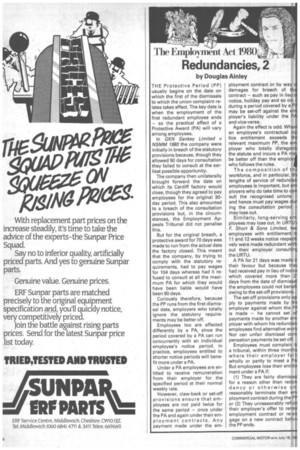The Employment Act198( Redundancies, 2
Page 50

If you've noticed an error in this article please click here to report it so we can fix it.
by Douglas Ainley
THE Protective Period (PP) usually begins on the date on which the first of the dismissals to which the union complaint relates takes effect. The key date is when the employment of the first redundant employee ends — so the practical effect of a Protective Award (PA) will vary among employees.
In GKN Sankey Limited v NSMM 1980 the company were initially in breach of the statutory provisions because, though they allowed 90 days for consultation they failed to consult at the earliest possible opportunity.
The company then unilaterally brought forward the date on which its Cardiff factory would close, though they agreed to pay employees for the original 90 day period. This also amounted to a breach of the consultation provisions but, in the circum stances, the Employment Appeals Tribunal did not penalise this.
But for the original breach, a protective award for 70 days was made to run from the actual date the factory closed. This meant that the company, by trying to comply with the statutory re quirements, had to pay wages for 104 days whereas had it re fused to consult at all the maximum PA for which they would have been liable would have been 90 days.
Curiously therefore, because the PP runs from the first dismis sal date, employers who totally ignore the statutory requirements may be better off.
Employees too are affected differently by a PA, since the period covered by a PA can run concurrently with an individual employee's notice period. In practice, employees entitled to shorter notice periods will benefit more under a PA.
Under a PA employees are entitled to receive remuneration from their employer for the specified period at their normal weekly rate.
However, claw-back or set-off provisions ensure that em ployees are not paid twice for
the same period — once under the PA and again under their em
ployment contracts. Any payment made under the em ployment contract or by way damages for breach of th contract — such as pay in lieu notice, holiday pay and so on during a period covered by a P may be set-off against the em ployer's liability under the and vice-versa.
Again the effect is odd. Whe an employee's contractual n tice entitlement exceeds t relevant maximum PP, the e ployer who totally disregar the statute and incurs a PA m be better off than the employ who follows the rules.
The composition of ti workforce, and in particular,1 lengths of service of redund employees is important, but ployers who do take time to 00 sult the recognised unions and hence must pay wages ing the consultation period may lose out.
Similarly, long-serving e ployees may lose out. In URTU F. Short & Sons Limited, twe employees with entitlement 1r 11 and 12 weeks notice respad vely were made redundant witl out their employer consultin the URTU.
A PA for 21 days was made i their favour but because the had received pay in lieu of noti which covered more than days from the date of dismissc the employees could not bene owing to the set-off provisions.
The set-off provisions only a ply to payments made by th employer against whom the P is made — he cannot set clr payments made by another ern ployer with whom his redundan employees find alternative work Nor can unfair dismissal corn pensation payments be set off.
Employees must complain tc a tribunal, within three months where their employer fail: wholly or partly to meet a PA But employees lose their entitle ment under a PA if: (1) They are fairly dismissec for a reason other than redun dancy or otherwise un reasonably terminate their ern ployment contract during the PP or (2) They unreasonably refuse their employer's offer to reney employment contract or re-ee gage on a new contract befoh the PP ends.




















































